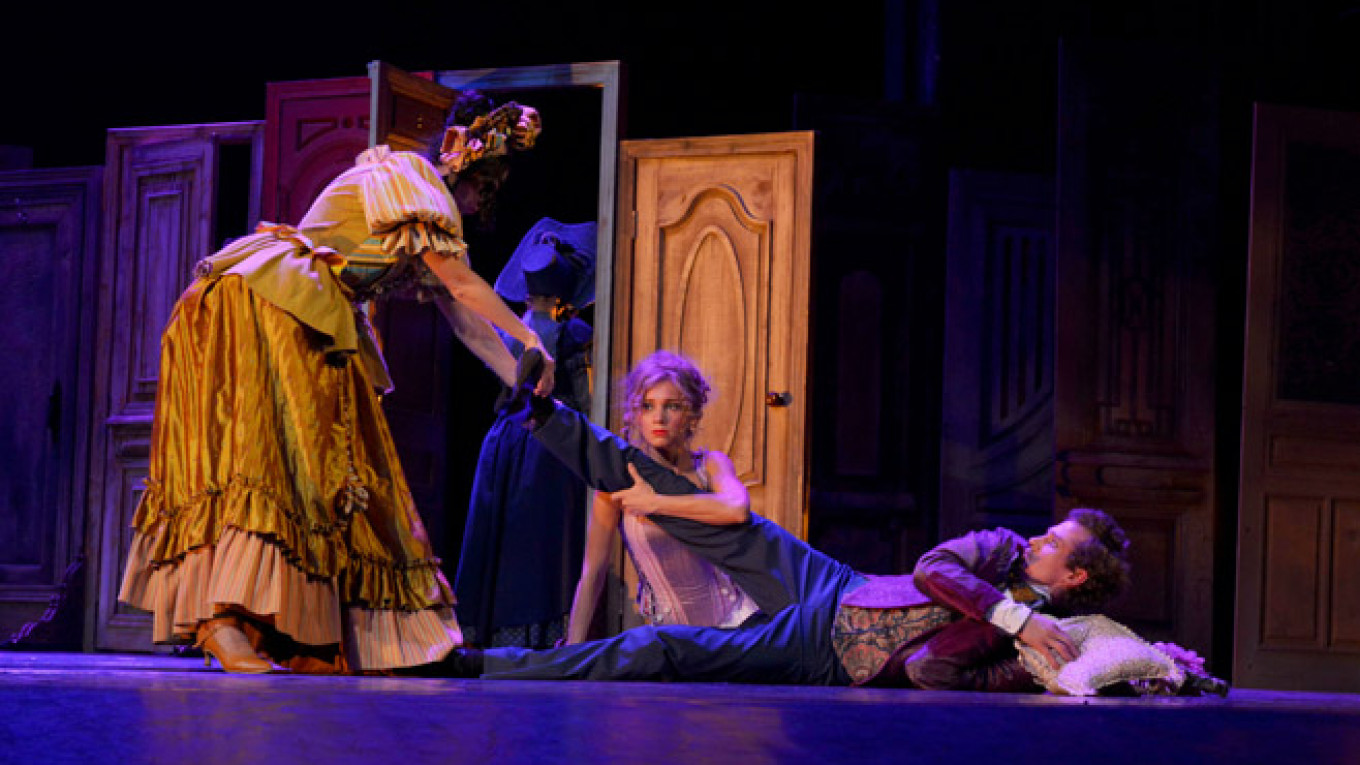Put away all that nonsense about, "I love theater but I don't go in Moscow because I don't know Russian."
I don't buy that balderdash and I've often used these pages over the years to argue the reasons why, although let's skip that today. My point is that if you are prone to using that excuse to justify staying home nights to watch the zombie box, you can't use it against Sergei Zemlyansky's marvelous new production of Nikolai Gogol's classic comedy "The Inspector General."
Zemlyansky is a choreographer and he did precisely what someone from the world of dance would be expected to do with a piece of literature — he threw out all the words.
The great thing is this: Even if your Russian is so good that you get every nuance of the Viktor Khinkis-Sergei Khoruzhy translation of James Joyce's "Ulysses," you won't need any of Gogol's words to get Zemlyansky's "Inspector General." As a good choreographer, he did his deed without tossing out any of the hilarious story.
Zemlyansky is an alumnus of Vladimir Pankov's Soundrama group, where music and physical activity are always given parity with the spoken word. For "Inspector General," Zemlyansky brought along several artists from the Pankov team, including Maxim Obrezkov, who designed the set made of doors, and Pavel Akimkin, one of Pankov's leading actors, who wrote the music.
Akimkin's folk-tinged music is right up front in this production. And there are times when that can cause problems, especially early on. At a certain point in the first 15 or 20 minutes you begin to wonder if anything besides exuberant accordion rhythms are ever going to take over the soundscape.
Finally, however, a liberating, extended stretch of total silence is followed by a major shift in the musical tone, which subsequently flows back and forth with variety among symphonic swells, chamber piano, and, yes, more of the rhythmic accordion.
Zemlyansky did not stage a ballet or even a modern dance production. It is more a mix of mime and physical theater with a few dance numbers thrown in for fun. Because it is unencumbered by the word, it embraces Gogol's relatively prolix comedy in just 90 minutes.
The entire story is there. We see a town full of pompous, corrupt officials, into whose midst a mysterious stranger has come. This is Khlestakov, the traveling shyster who, with his aloof servant Osip, usually stays one town ahead of his creditors and detractors.
Once Khlestakov realizes that the townspeople have mistaken him for an inspector general on a secret mission, he plays the situation for all he is worth, pulling down bribes and pulling down the petticoats of the wife and daughter of the town mayor.
The bacchanalia of lies and chutzpah comes to an abrupt end when the trickster makes the mistake of writing a letter to a friend and describing his wild conquests. That letter falls into the wrong hands and Khlestakov, aided by the ever-alert Osip, makes a hasty exit.
Khlestakov is played in rotating casts by two actors. I happened to see Alexander Kudin and I found him to be a revelation.
Obviously playing on the stylistics of silent film, Kudin looked to be more a combination of Buster Keaton and Harold Lloyd than Charlie Chaplin, although the Chaplin connection showed through at times as well. Expressionless, seemingly often ready to topple over, but always in total control of his body, Kudin turned in one of the funniest, most effective Khlestakovs I have ever seen.
As his smarter, more cynical and more earth-bound servant Osip, Nikita Tatarenkov was Khlestakov's ideal counterweight. This Osip has a complete life of his own and is perfectly capable of looking out for his own interests without ever entirely abandoning his master.
One of the most powerful scenes brings the town clowns Dobchinsky (Ilya Malanin) and Bobchinsky (Pavel Botvinovsky) out on stage as two Ukrainian maidens who lead the entire cast in a rousing Ukrainian folk dance.
Far be it for me to see politics where none are to be had, but it is a fact: The Moscow audience went wild over that scene.
"The Inspector General" is one of the must-sees of the season.
"The Inspector General" (Revizor) plays March 6 and 28 at 7 p.m. Yermolova Theater, located at 5/6 Tverskaya Ulitsa. Metro Okhotny Ryad. 495-629-0594. ermolova.ru. Running time: 1 hour, 30 minutes.
Contact the author at artsreporter@imedia.ru
A Message from The Moscow Times:
Dear readers,
We are facing unprecedented challenges. Russia's Prosecutor General's Office has designated The Moscow Times as an "undesirable" organization, criminalizing our work and putting our staff at risk of prosecution. This follows our earlier unjust labeling as a "foreign agent."
These actions are direct attempts to silence independent journalism in Russia. The authorities claim our work "discredits the decisions of the Russian leadership." We see things differently: we strive to provide accurate, unbiased reporting on Russia.
We, the journalists of The Moscow Times, refuse to be silenced. But to continue our work, we need your help.
Your support, no matter how small, makes a world of difference. If you can, please support us monthly starting from just $2. It's quick to set up, and every contribution makes a significant impact.
By supporting The Moscow Times, you're defending open, independent journalism in the face of repression. Thank you for standing with us.
Remind me later.







